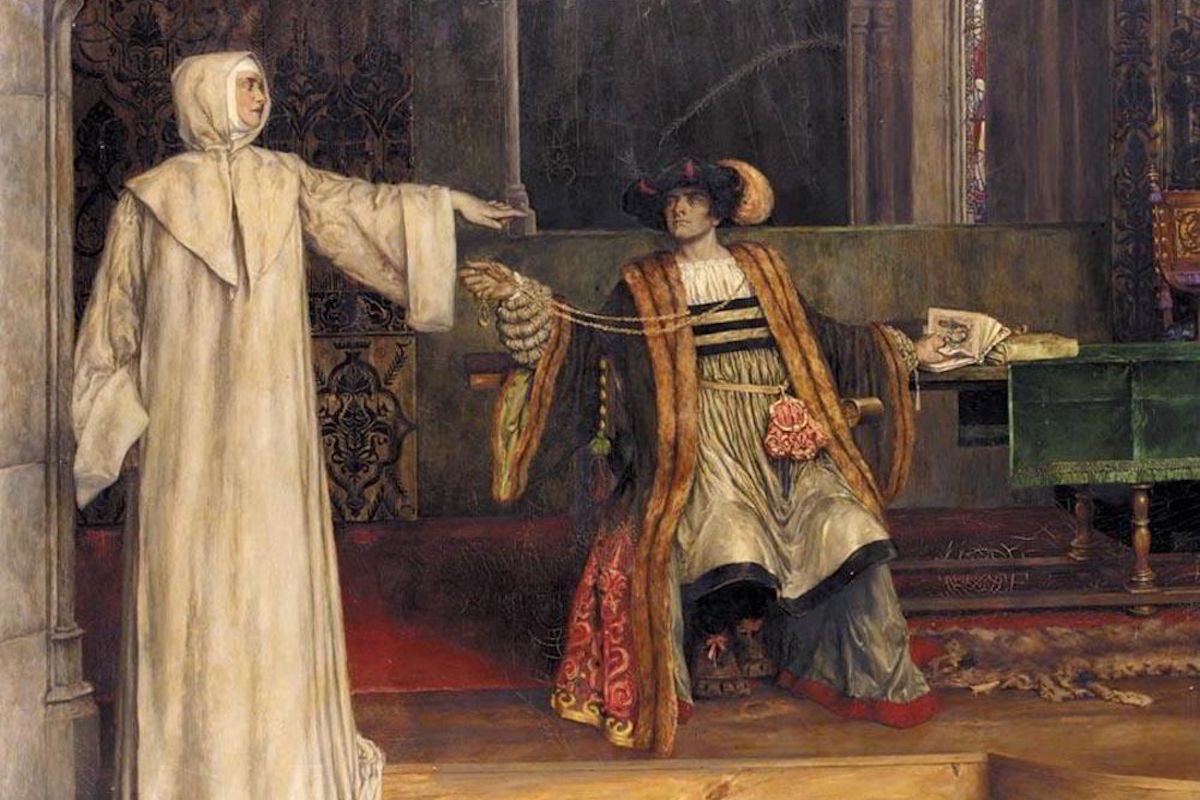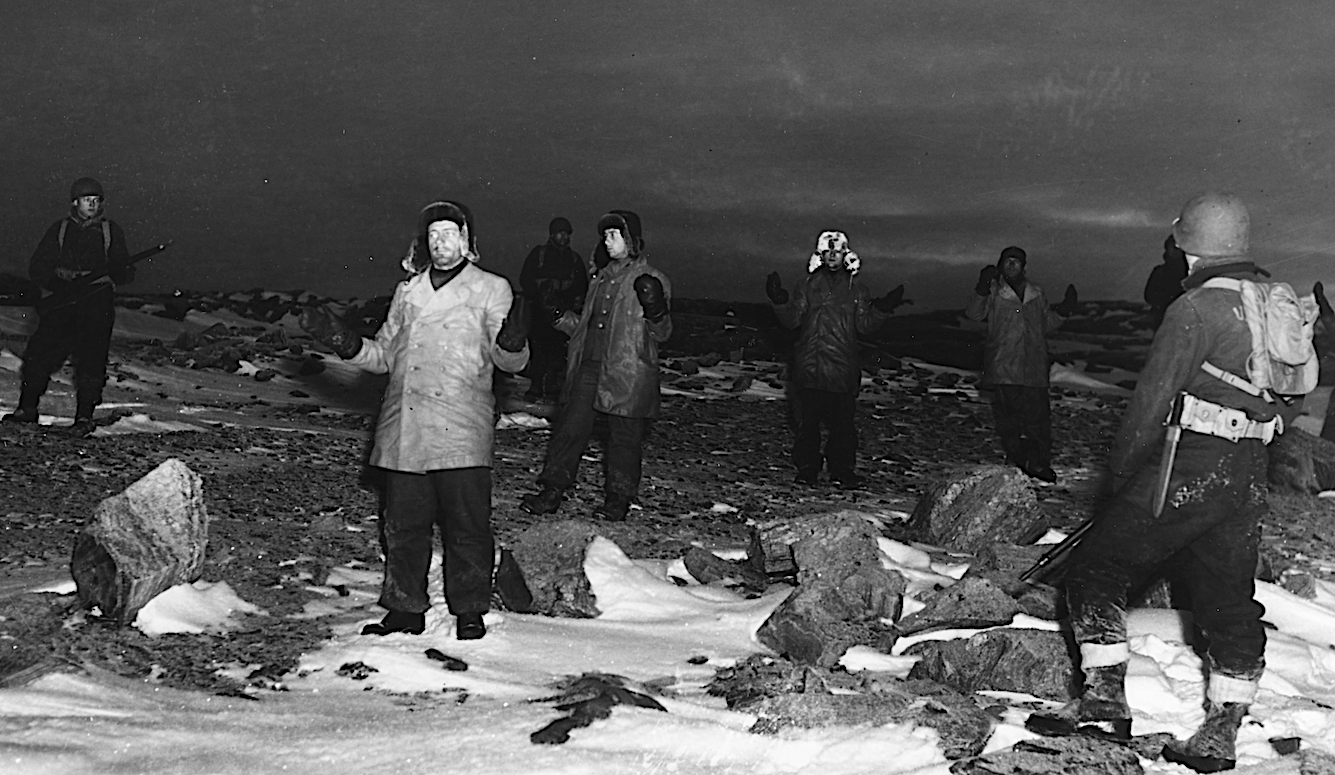Art
“Unsex Me Here' and Other Bad Ideas
What contemporary feminism fails to adequately grapple with is nature itself, and as a result, feminist attitudes towards men, and particularly towards male sexuality, are compassionless and punitive (not to mention humourless—and human sexuality is so often very funny!).

“Come, you spirits / That tend on mortal thoughts, unsex me here.” This, one of Lady Macbeth’s most famous lines, is cited by Elizabeth Winkler in her recent Atlantic essay, “Was Shakespeare a Woman?,” as a thrilling instance of a woman’s resistance to femininity. Winkler then goes on to compare Lady Macbeth’s anger to women’s #MeToo “fury.” “This woman,” Winkler says of Lady Macbeth, woke her out of her “adolescent stupor” by “rebelling magnificently and malevolently against her submissive status.”
Of course, what Lady Macbeth is actually about to do is help her husband murder an innocent man, the king, in cold blood while he sleeps under her own roof. Unless one aligns female empowerment with sociopathic behavior, this isn’t really a triumphant moment for women’s liberation. Nor would any reading of the text other than a willfully perverse one count her as one of Shakespeare’s admirable characters. When she celebrates Lady Macbeth as one of Shakespeare’s heroines simply because Lady M has the desire to do something horrific, there is indeed something adolescent about Winkler’s attitude.
In the many responses to Winkler’s article, scholars have rightly countered that it was in fact (surprise!) William Shakespeare who wrote William Shakespeare’s plays and poems, and that The Atlantic has compromised its journalistic integrity by publishing a new (and groundless) spin on a snobbish nineteenth century conspiracy theory. The responses to Winkler’s piece address serious gaps in her research and provide historical context that discredits her most basic assertions, and the question of Shakespeare’s authorship has been corrected (again) by competent scholars.
But what I find more troubling is the assumption that forms the foundation of Winkler’s thesis: the belief that men don’t really like women, at least not enough to think and write about them with understanding and empathy; not enough to see the value in female friendships and feminine bonds of love and fidelity; and certainly not enough to find strong, tough, funny, clever women believable, admirable, and desirable. When I consider the men I know, male friends and relatives, colleagues, fathers of my children’s classmates, Winkler’s failure to entertain the notion that a man could have written the compelling female characters that populate Shakespeare’s plays is more than merely baffling, it is an insult to men, both past and present.
I have written elsewhere about how contemporary feminism needs the idea of an oppressive patriarchy in order to define women as victims of oppression, and as such it seeks to attach to men a primal stain of (toxic) masculinity so that third-wave feminism is righteously justified in all its complaints against them. Fighting “The Patriarchy” is feminism’s raison d’etre, and without this enemy the cause itself is in jeopardy (see Feminism’s Dependency Trap in Quillette). It seems as though Winkler’s take on Shakespeare is yet another iteration of feminism’s belief that men have a blind spot for women’s humanity. The irony of the current feminist orthodoxy, however, is that it is women who fail to see men’s position clearly. A further —and funnier—irony, if one has a palate for the absurd and the tragic, is that most men, for their part, are usually so chivalrous, so solicitous of women as people, that they sympathize with women’s crusade against them, and by and large assent to women’s complaints. They must really like us!

Winkler completed an MA in English Literature in 2013, at the same time that I was working on my doctorate on Shakespeare, which makes the two of us grad school contemporaries. I understand well the myopic feminist perspective of English departments, of how students are often trained to read specifically for attitudes of unfairness towards women in order to confirm the narrative of women’s victimization. I also understand how the “male gaze,” men’s sexualization of women, is treated punitively, as a dirtiness within men that can cause them to dehumanize women and which can lead to cruelty. And of course this is sometimes tragically true.
But what troubles me is that women commonly fail to appreciate the internal struggle men have with their sexual instincts, and instead condemn them for having these instincts at all. In other words, consciousness raising feminism rightly asserts that men shouldn’t treat women like objects for their use, but it does so while being unconscious of men’s humanity, and as a consequence, both minimizes and punishes the male sexual instinct that causes men to see women sexually in spite of men’s civilizing efforts not to.
What contemporary feminism fails to adequately grapple with is nature itself, and as a result, feminist attitudes towards men, and particularly towards male sexuality, are compassionless and punitive (not to mention humourless—and human sexuality is so often very funny!). With a blind spot for men’s experiences, consciousness raising feminist attitudes towards male sexual energy are unlikely to inspire mutual respect, and instead work to engender resentment, anxiety, and unhappiness.
As I grow older, I’m becoming increasingly aware of and sympathetic to the internal struggle between powerful sexual instincts and self-possession that most men contend with every day. Many women have an active libido, but in my experience the vast majority of women think about sex much less than men do. Women: imagine what it would be like to think about sex a lot, then quadruple what you’ve just imagined, and now you’re in the ballpark of the average man. It would be exhausting, I can only imagine, to constantly have to assert one’s own self-restraint over an appetite that gnaws at one’s imagination from moment to moment. But to be made to feel somehow polluted for the appetite itself, the appetite that men most usually successfully control and deny would be almost intolerable.
An obvious oversight in Winkler’s grad school approach to understanding Shakespeare is that while she is correct to assert that Shakespeare wrote female characters with whom he clearly empathises, she might have at least once considered that he also does the same with men. In what follows, I want to look briefly at one of Shakespeare’s most reprehensible male characters, the magistrate Angelo from Measure for Measure. I want to think about him carefully, not merely to look at how he uses his power to mistreat women in Weinstein-esque fashion (although he does indeed do this), and not simply to condemn him for his misogynistic sexual anger (although his behavior is very wrong). But, rather, to try to understand his internal struggle with his own lack of self-sovereignty, the crisis that his desire elicits: the sudden, inescapable, and unwanted pressure that his sexual nature exerts over his better judgement which overturns his self-autonomy and will.
Of Angelo, other characters remark that he “scarce confesses / That his blood flows, or that his appetite / Is more to bread than stone,” and until he lays eyes on Isabella, Angelo would have agreed with this assessment of him. But when he sees her, Angelo becomes the quintessential #MeToo perpetrator. He uses his political position to coerce Isabella, a young novice one day away from taking her vows as a nun, into having sex with him. If she doesn’t, he will use his power to behead her brother: capital punishment for the crime of having premarital sex. Angelo is a compassionless magistrate, a sexual predator, and a hypocrite all rolled into one. There is nothing admirable about him, except for his unflattering self-honesty, and his total lack of self-delusion.
In contemporary expressions of male predatory sexuality told from the perspective of women, such as Margaret Atwood’s The Handmaid’s Tale, now a popular television show, men are viewed as powerful, threatening, and in a real sense empty of humanity, a kind of monolith of authority. Shakespeare’s Angelo is very different in that when his sexual appetite is awakened, he realizes that he is in fact almost entirely powerless. He doesn’t want to want her, and is confused and overwhelmed by how his sense of identity and autonomy have been absolutely overturned by this woman, who intended to do nothing of the sort. It is in part his astonishment at his own sexual desires, and in part his disgust with these desires, that make him so fascinating.

“What’s this? What’s this?” he asks himself as soon as Isabella takes her leave after pleading with him to have mercy on her brother’s life, “Is it her fault or mine? / The tempter or the tempted who sins most, ha? / Not she, nor doth she tempt; but it is I.” In this moment Angelo encounters for the first time his own sexual nature that he would really and truly prefer to be without. Unacknowledged in himself previously, Angelo judges harshly others’ sexual desires (that is why he has arrested and condemned to death Isabella’s brother). In some ways, he is the #MeToo movement’s goal: to have an impartial bureaucratic system of rules rather than any actual humans arbitrate the morality that governs sexual behavior. His lack of humanity is what might make his authority fair, if it weren’t so brutal. And it is his encounter with his own messy humanity that causes him to realize that the self he has constructed, the chosen identity he wanted for himself, has collided with a nature about which he can do little to change. We are, all of us, in some ways, not at home in our bodies.
I am obviously not endorsing Angelo’s course of action. He is the slimy villain of this play, there is no doubt about that. And I am obviously not excusing any man’s sexual coercion of a woman. These are serious criminal and immoral acts. It isn’t at all Angelo’s submission to his desires that I find instructive here, but rather the internal self-abasement he feels at having them in the first place, a self-abasement that is transformed into self-disgust because he suddenly realizes how little control he has over his lust. “Blood, thou art blood,” he says. “I have begun, / And now I give my sensual race the rein.”
Again, and I feel like I need to keep repeating this here lest I be misunderstood and used to excuse sexual aggression, Angelo does not have control over his nature, but he does over his behaviour, and it is his refusal to find himself up for the task of contending with his nature that makes him a villain. What feminism doesn’t understand, and probably doesn’t want to understand because it might create compassion for male sexuality, is the internal struggle of men against their own appetites. Men must possess and exert a strong and powerful will, not over women to pressure them into unwanted sex, but over themselves so that they don’t. The male will, what Simone de Beauvoir called transcendence over immanence, might be a very real quality because from adolescence onwards men must be well practiced in it.

I once asked an uncommonly honest male friend to describe how he felt when he looked at a beautiful image of a nude woman. Keep in mind that this is a decent man: a supportive husband and friend to his wife, and a tender father to his two daughters. His response was this: “Precisely because they are so high, one wants to bring them low. Male sexuality is basically a form of slave morality, in which women are the oppressors. They make us weak. Only in the moment of surrender and penetration is this reversed, and redeemed. This is the deep mystery—why men are so enslaved to women, so keen to please them.” His response was politically incorrect, borderline indecent, sexually subversive, and, I think, entirely accurate.
When Angelo encounters his own sexual nature after meeting with the beautiful novice Isabella—a character so pure and so unassailable that she is called “enskied and sainted” by another male character in the play—he says this: “Shall we desire to raze the sanctuary / And pitch our evils there? O, fie, fie, fie!” “Raze the sanctuary,” Angelo says. It is precisely because Isabella is so high, so enskied, that he wants to bring her low.
You might be asking, “Ok, men have powerful sexual desires that their masculine assertiveness must work to control. What now?” I am asking myself this same question, and of course there is no easy answer. The history of civilization is, in many respects, our struggle with the intractable problem of human sexuality: the conflict of our Nature and our Reason. Some cultures have taken the tack that it’s better to try and eliminate men’s oppressive sexual nature by hiding their oppressors, and so we can see the burka, for instance, as an attempt to minimize the constant gnawing pressure of male sexual instincts, with greater or lesser success. In the West, other codes have been adopted. Christianity’s influence, the ideas of self-sacrifice, service, and human dignity, have mixed with barbaric European warrior cultures, which resulted in the codes of chivalry. This approach to our sexuality has worked, not perfectly, but pretty well, actually, all things considered. Yet now the ground of Western civilization is shifting, not from influences outside us, but from within, and the assumptions of chivalrous attitudes are the very things being taken to task. What’s next? Women’s revenge? (I’ve read Hamlet—revenge seems like a bad idea.) An unsexing of the selves? (I’ve read Macbeth; this one seems like a bad idea, too.)
Shakespeare’s genius should no longer surprise us. We’ve had his works for 400 years, and we know how brilliant they are. And yet I am still taken aback by the man’s insight into human behaviour. The play, as I’ve said, is titled Measure for Measure, which is a line Shakespeare has taken from the Bible: “Judge not, that ye be not judged,” Christ says, “For with what measure ye mete, it shall be measured to you again.” Measure for measure; tit for tat. It is true that due to men’s insecurity, self-loathing, and fragile egos, they have often put the blame for their own sexual desires onto women, because they have not understood themselves and weren’t courageous and strong enough to contend with their own urges. It is because of the behavior of these failed men that women now feel justified in judging men harshly for their sexual nature and instincts. But neither of these camps have been successful in resolving the discord between the sexes because they have been judging each other by the same compassionless standards that ignore or condemn our nature, writ large. Angelo fails so miserably to control himself because he failed to treat with respect his own weakness in the face of sexual temptation: “Ever till now,” he admits, “When men were fond, I smiled and wondered how.”
Just as Angelo fails to respect his own sexual nature until it overpowers him, the near-nun Isabella also fails to contend with her nature as a woman. She is disgusted with her feminine sexual nature, it seems, which is why she desires to enter into the strictest order of nuns in the first place. Isabella’s relationship to her own sexuality is complex, but at bottom what she lacks is the strength and willpower needed to confront and handle her sexual power over men. She doesn’t know what to do with her sex appeal. Like Angelo, what she has been unwilling to face is her own nature. Since she isn’t up for the task, she seeks to retreat absolutely from the challenge: become a nun of the strictest order. Without men to desire her, in herself she becomes sexless. In Isabella we are faced with the flip-side to Lady Macbeth’s “unsex me here,” which is, in that play, too, a rejection and denial of nature, not, as Winkler wants to believe, of woman’s submissive social status. By vilifying the male sexual desire for women, consciousness-raising feminism seeks to relieve women of the burden of confronting the part of their own sexual nature that comes into being as a response to male desire.
What Shakespeare does is to define the terms of our options, and the terms are measure for measure. We can either attempt to understand each other honestly, or we can persist in mutual incomprehension, fear, and anxiety. How we see each other will be how we are in turn seen. Angelo cannot face his own nature, and neither can Isabella; they are in fact two sexual cripples who lack the fortitude to contend with themselves, and become as a result compassionless, rigid, and destructive, albeit in different ways.
If contemporary feminist orthodoxy insists that masculine sexual energy is, in itself, “toxic” and must thus be written out of social discourse, women will not have to contend with their own powerful sexual nature as the inspiration and location for the masculine imagination. But women’s condemnation of men’s sexuality will not inspire women to understand themselves sexually, nor is it likely to help men understand women. No woman should lose her sense of agency and self-integrity, but is it really such a horror to accept that we’re not entirely autonomous creatures, that we’re, in fact, meant to understand ourselves not merely as individuals, but relationally? The failure to contend with our natures because it is easier to retreat into our own self-willed dream of autonomy seems less like moral progress, and more like a lonely lack of courage.
So what is the answer to the intractable battle of the sexes? Hopefully it will continue to be a somewhat awkward answer, one that we will have to fumble through together. But if we do not treat our natures with honesty and understanding, with affection, humour, and generosity, then I am unconvinced that we will become less resentful, more just, or in any way happy about our human bodies.







